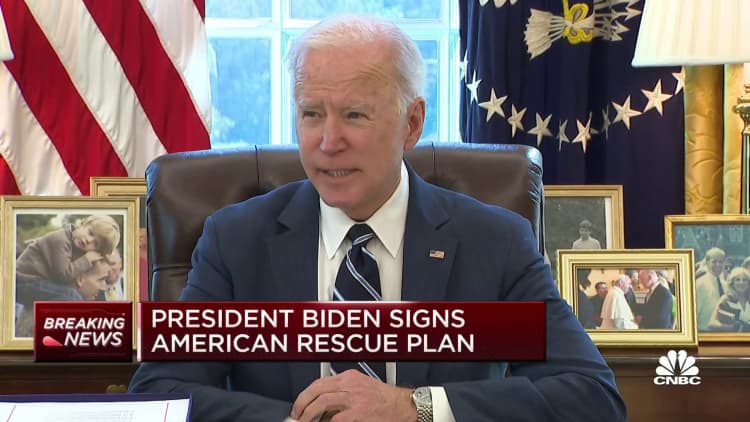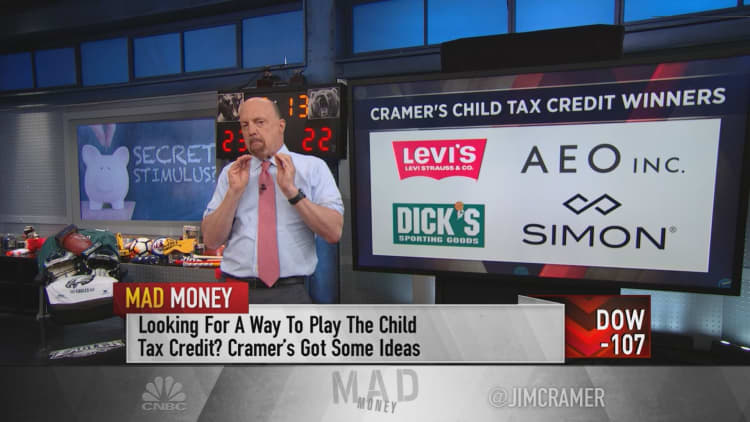It's a historic day for U.S. families with children.
Roughly $15 billion has been sent to 35.2 million families in the first of six advance child tax credit payments, according to the U.S. Treasury Department and IRS. The average payment in the first round is $423, and will reach nearly 60 million children, the agency said.
"For the first time in our nation's history, American working families are receiving monthly tax relief payments to help pay for essentials like doctor's visits, school supplies, and groceries," said Treasury Secretary Janet Yellen in a statement. "This major middle-class tax relief and step in reducing child poverty is a remarkable economic victory for America — and also a moral one."
More from Invest in You:
How to navigate the child tax credit payments process
Has the 4-day workweek's time come? Some predict it will catch on
Child tax credit payments will help offset loss of pandemic programs
The enhanced child tax credit is one of the largest anti-poverty measures seen in the U.S. since President Lyndon B Johnson's war on poverty was launched in 1964. It's also the first time a major tax credit has been sent in advanced payments, and on a monthly basis, according to Treasury senior administration officials.
"It is a huge deal," said Arohi Pathak, director of policy at the Poverty to Prosperity program at the Center for American Progress. "[The child tax credit] is a huge relief for way too many working parents and particularly during this pandemic."
The enhanced child tax credit
The American Rescue Plan passed in March added to the existing child tax credit. For 2021, the maximum enhanced credit is $3,600 for children younger than age 6 and $3,000 for those between 6 and 17. The regular child tax credit was $2,000 for children under the age of 17.
Half of the money will be distributed as an advance on 2021 tax credits in monthly payments from July to December — the second half will be claimed when families file taxes next year. For households getting the full benefit, payments will be $300 per month for children under the age of 6 and $250 for those between the ages of 6 and 17.

There's no limit on the number of eligible children who can receive the credit. For example, a family with three children ages 5, 8 and 10 who qualified for the full credit would get $800 per month.
The full credit is available to eligible households with adjusted gross income less than $150,000 for married couples filing jointly and $75,000 for individuals. The enhanced credit phases out for married couples filing jointly making $170,000 annually and individuals earning $95,000, though they'd still qualify for the regular child tax credit.
Families who would rather take the entire credit in a lump sum next year can do so by opting out of monthly payments through an IRS portal. So far, about 1 million households have done this, the agency said.
Impact of the expansion
Beyond giving families with kids more money, the enhanced credit was also made fully refundable to ensure relief would reach the poorest households.
A fully refundable credit means that families don't have to have any taxable income to claim the benefit. This will reach about 27 million children, representing half of the Black and Latino youth who previously did not get the credit, according to the Center on Budget and Policy Priorities.
"It's going to target the folks who need the support the most," said Joanna Ain, associate director of policy at Prosperity Now, a financial literacy nonprofit organization.
With the change, the enhanced credit will reach nearly 90% of children, according to the IRS. It will also lift about 4.1 million above the poverty line, including 1.7 million who are Latino, 1.2 million who are Black and 814,000 who are Asian-American, according to the Center on Budget and Policy Priorities. This will slash the child poverty rate by roughly 40% and lift even more out of deep poverty, according to the Center.
Our position has been clear – we must make the child tax credit permanentRosa DeLauroU.S. Representative, D-Conn.
Another estimate by the Center on Poverty and Social Policy at Columbia University found that the enhanced tax credit would slash child poverty by 45% and reduce poverty by 52% for Black children, 45% for Hispanic children and nearly 62% for Native American children.
The timing may also help offset programs that have helped families make it through the pandemic but are ending soon, such as additional unemployment insurance, the eviction moratorium and mortgage forbearance program.
Confusion for some families
Of course, some of these families may struggle to access the credit. If they traditionally do not file a tax return and did not use the IRS non-filers' tool to claim an economic impact payment, they need to sign up for the money on the agency's site.
That's led to confusion for some. Nearly 80% of non-filers said that they'd heard only some, little or nothing about the new child tax credit, according to a recent survey by SaverLife, a nonprofit, and the Economic Security Project.
Still, families who sign up for the credit late will receive the full half they're owed in advanced payments, according to senior administration officials. This would likely result in fewer but larger payments before December, according to the agency.

What's next
Currently, the credit is only available for the tax year 2021, meaning that in December the monthly payments will abruptly cease.
But lawmakers are pushing to extend the benefit or make it permanent. President Joe Biden has proposed keeping the enhanced credit in the coming years in his infrastructure package, and several congressional Democrats want to make the benefit permanent.
"Our position has been clear — we must make the child tax credit permanent," said Rep. Rosa DeLauro, D-Conn., at a press event on Wednesday. "We have a real opportunity here, not to just throw money at a problem, but to build an architecture for the future and use this as a moment to lift up all children and families."
Even though legislation has not yet been passed, the Treasury Department and IRS are preparing for the the program to last more than a year.
"It is nobody's plan that this will exist for just 2021," a senior administration official said on a Wednesday call with reporters.
SIGN UP: Money 101 is an 8-week learning course to financial freedom, delivered weekly to your inbox.
CHECK OUT: How to make money with creative side hustles, from people who earn thousands on sites like Etsy and Twitch via Grow with Acorns+CNBC.
Disclosure: NBCUniversal and Comcast Ventures are investors in Acorns.






